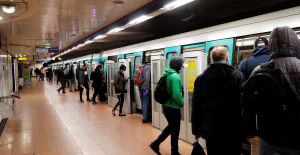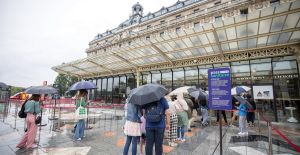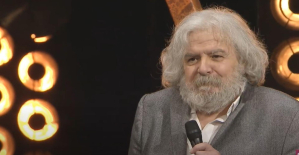Anke Hessler is happy that her part-time application has already been approved. Because it is more than questionable that the sports and chemistry teacher from the Ruhr area would get a reduction in her working hours to 80 percent from the school authorities for the coming school year. After all, the 55-year-old has no small children to look after and does not care for any other relatives.
"After many years of service and ever-increasing demands, I'm just exhausted and need a little more rest," she reports. A few years ago she had recovered from a serious illness, and although she does not care for her 92-year-old mother herself, she would like to visit her parents' house a two-hour drive away frequently.
Colleagues describe Hessler as a very dedicated teacher. She likes to accompany her students on school trips, organizes trips to the museum or participation in competitions. “I reduce my hours primarily so that I can continue to teach with commitment,” says Hessler. Who would deny her?
The teacher has the misfortune to teach two absolute shortage subjects. And as a measure against the shortage of teachers, experts are now recommending limiting part-time work, as this is where the greatest treasure trove of teaching reserves can be found. At the end of January, the 16 educational researchers of the Standing Scientific Commission (SWK) presented recommendations to the Conference of Ministers of Education on how to deal with the acute shortage of teachers. One of the key demands: moving away from the generous use of part-time work.
47 percent of teachers worked with reduced hours in 2020, 30 percent of men and 54 percent of women. A total of around 447,000 teachers are part-time. “The SWK recommends limiting the possibility of part-time work. This is where the largest employment reserve lies,” says the statement. Even a moderate increase in the working hours of all part-time teachers would have “considerable effects”. The possibility of a reduction to below 50 percent should therefore only be granted “if there are narrow reasons”, for example to look after small children.
The recommendation led to an outcry in specialist circles. With their initiative, the scientists ignored the reasons why teachers work part-time, says GEW boss Maike Finnern. "This ignorance of the SWK has led to annoyance, sometimes outrage, among many teachers." The proposal disregards the work that teachers do in times of multiple crises. "He ignores the reality of life and work in schools."
The newly founded "Education Council from below" around the former Berlin Secretary of State for Education Mark Rackles criticized: "Little empiricism, a lot of gut feeling. But above all: primarily measures that can be had cheaply and quickly at the expense of the active teachers. This further increases the pressure on school practice.”
The Conference of Ministers of Education, on the other hand, now seems surprised by the wave of outrage. In the list of measures adopted last week to deal with the shortage of teachers, the part-time topic is only covered in a slur. The states would examine the recommendations of the SWK, "which focus on exploiting the potential of qualified teachers," it says succinctly. The KMK reacted correctly insofar as they "didn't pour any more fuel on the fire", but first gave themselves an inspection order, commented GEW boss Finnern.
The topic is not off the table. In North Rhine-Westphalia, Education Minister Dorothee Feller (CDU) has already included the restriction of part-time work in her “Action Concept for Teaching”. It states: "Applications by teachers for part-time employment that are not related to family reasons are examined intensively to determine whether official reasons in individual cases preclude approval to the extent requested."
Even parents are up in arms about the project. "We consider this to be playing with fire," says Stephanie Helder-Notzon, Chairwoman of the State Parents' Association for Integrated Schools in North Rhine-Westphalia. She knows many teachers who, even after the family phases, "due to the intensity and conscientiousness of carrying out their tasks, work part-time to the edge of their capabilities".
For Tanja Küsgens, vice-principal of the Catholic primary school in Düren, the idea is actually more of a method of deterring teachers in the long run. "We just have to think about how we can make the profession more popular," says Küsgens, who is also chairwoman of the VBE educational association in North Rhine-Westphalia.
German schools manage the shortage: the performance is getting weaker, the dropout rate is increasing. Nevertheless, 14 out of 16 federal states do not feel responsible and are staying away from the education summit in Berlin.
Source: WORLD
"Restricting part-time work, on the other hand, would be one reason why young people decide against the profession," says Küsgens. “Today we are no longer talking about work-life balance, but about life-work balance. It's not easy anyway when I can work from home elsewhere. A lot of people are wondering why they should do this backbreaking job.”
The district government of Cologne had already tested part-time restrictions in the past two years. In the end it wasn't worth it. By rejecting part-time applications, only two full jobs were saved out of a total of several thousand. "Part-time work for colleagues with underage children is now usually granted," says Küsgens, "but the application for part-time work by colleagues over 50 for health or other reasons must be very precisely justified - otherwise it is often rejected."
In addition, the initiative stifles the development of couples dividing up work at home at an early stage. "Care work is still mainly done by women," says Küsgens. “That is only changing very gradually. Restricting part-time work would make it impossible to redistribute work at home and nip redistribution to fathers in the bud.” The teaching profession is still primarily female; 90 percent of the teachers in elementary school are women, and around 75 percent in secondary schools.
According to Küsgens, he knows colleagues who left out of frustration and said: I'm doing something different. The risk that several people come up with this idea should not be taken under any circumstances.
"Kick-off Politics" is WELT's daily news podcast. The most important topic analyzed by WELT editors and the dates of the day. Subscribe to the podcast on Spotify, Apple Podcasts, Amazon Music, among others, or directly via RSS feed.

 B:SM will break its investment record this year with 62 million euros
B:SM will break its investment record this year with 62 million euros War in Ukraine: when kyiv attacks Russia with inflatable balloons loaded with explosives
War in Ukraine: when kyiv attacks Russia with inflatable balloons loaded with explosives United States: divided on the question of presidential immunity, the Supreme Court offers respite to Trump
United States: divided on the question of presidential immunity, the Supreme Court offers respite to Trump Maurizio Molinari: “the Scurati affair, a European injury”
Maurizio Molinari: “the Scurati affair, a European injury” Irritable bowel syndrome: the effectiveness of low-carbohydrate diets is confirmed
Irritable bowel syndrome: the effectiveness of low-carbohydrate diets is confirmed Beware of the three main sources of poisoning in children
Beware of the three main sources of poisoning in children First three cases of “native” cholera confirmed in Mayotte
First three cases of “native” cholera confirmed in Mayotte Meningitis: compulsory vaccination for babies will be extended in 2025
Meningitis: compulsory vaccination for babies will be extended in 2025 Thanks to intelligent cameras, RATP will indicate the least crowded trains on line 14
Thanks to intelligent cameras, RATP will indicate the least crowded trains on line 14 Dubai begins the transformation of Al-Maktoum to make it the future “largest airport in the world”
Dubai begins the transformation of Al-Maktoum to make it the future “largest airport in the world” When traveling abroad, money is a source of stress for seven out of ten French people
When traveling abroad, money is a source of stress for seven out of ten French people Elon Musk arrives in China to negotiate data transfer and deployment of Tesla autopilot
Elon Musk arrives in China to negotiate data transfer and deployment of Tesla autopilot Two people arrested for attempted damage to classified property at the Musée d’Orsay
Two people arrested for attempted damage to classified property at the Musée d’Orsay Death of composer Jean Musy, at 76, author of the music of Papy fait de la resistance, Les Champs-Élysées
Death of composer Jean Musy, at 76, author of the music of Papy fait de la resistance, Les Champs-Élysées Fanny Ardant prodigious in The Wound and the Thirst
Fanny Ardant prodigious in The Wound and the Thirst Hospitalized for pneumonia, Véronique Sanson cancels her concert in Nantes
Hospitalized for pneumonia, Véronique Sanson cancels her concert in Nantes Skoda Kodiaq 2024: a 'beast' plug-in hybrid SUV
Skoda Kodiaq 2024: a 'beast' plug-in hybrid SUV Tesla launches a new Model Y with 600 km of autonomy at a "more accessible price"
Tesla launches a new Model Y with 600 km of autonomy at a "more accessible price" The 10 best-selling cars in March 2024 in Spain: sales fall due to Easter
The 10 best-selling cars in March 2024 in Spain: sales fall due to Easter A private jet company buys more than 100 flying cars
A private jet company buys more than 100 flying cars This is how housing prices have changed in Spain in the last decade
This is how housing prices have changed in Spain in the last decade The home mortgage firm drops 10% in January and interest soars to 3.46%
The home mortgage firm drops 10% in January and interest soars to 3.46% The jewel of the Rocío de Nagüeles urbanization: a dream villa in Marbella
The jewel of the Rocío de Nagüeles urbanization: a dream villa in Marbella Rental prices grow by 7.3% in February: where does it go up and where does it go down?
Rental prices grow by 7.3% in February: where does it go up and where does it go down? Europeans: a senior official on the National Rally list
Europeans: a senior official on the National Rally list Blockade of Sciences Po: the right denounces a “drift”, the government charges the rebels
Blockade of Sciences Po: the right denounces a “drift”, the government charges the rebels Even on a mission for NATO, the Charles-de-Gaulle remains under French control, Lecornu responds to Mélenchon
Even on a mission for NATO, the Charles-de-Gaulle remains under French control, Lecornu responds to Mélenchon “Deadly Europe”, “economic decline”, immigration… What to remember from Emmanuel Macron’s speech at the Sorbonne
“Deadly Europe”, “economic decline”, immigration… What to remember from Emmanuel Macron’s speech at the Sorbonne These French cities that will boycott the World Cup in Qatar
These French cities that will boycott the World Cup in Qatar Mercato: Fonseca coach of AC Milan? The Lille coach speaks
Mercato: Fonseca coach of AC Milan? The Lille coach speaks Ligue 1: OM with a three-way defense, Lens changes almost nothing
Ligue 1: OM with a three-way defense, Lens changes almost nothing Ligue 1: PSG officially crowned champion of France for the 12th time
Ligue 1: PSG officially crowned champion of France for the 12th time Ligue 1: Lyon offers Monaco and gets closer to a European place
Ligue 1: Lyon offers Monaco and gets closer to a European place

















